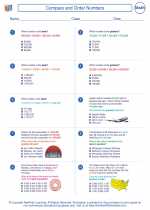Quadratic Formula
The quadratic formula is a method used to solve quadratic equations of the form ax^2 + bx + c = 0, where a, b, and c are constants and a ≠ 0. The quadratic formula states that the solutions for x can be found using the formula:
x = (-b ± √(b^2 - 4ac)) / (2a)
Understanding the Quadratic Formula:
To use the quadratic formula, you need to identify the values of a, b, and c in the quadratic equation. Once you have these values, you can substitute them into the quadratic formula to find the solutions for x.
Step-by-Step Guide to Using the Quadratic Formula:
- Identify the values of a, b, and c in the quadratic equation ax^2 + bx + c = 0.
- Substitute the values of a, b, and c into the quadratic formula: x = (-b ± √(b^2 - 4ac)) / (2a)
- Simplify the expression under the square root: Δ = b^2 - 4ac.
- If Δ is positive, there are two distinct real solutions. If Δ is zero, there is one real solution (a repeated root). If Δ is negative, there are two complex solutions.
- Use the values of a, b, c, and Δ to find the solutions for x using the quadratic formula.
Example:
Let's solve the quadratic equation 2x^2 - 5x + 2 = 0 using the quadratic formula.
First, identify the values of a, b, and c:
- a = 2
- b = -5
- c = 2
Substitute these values into the quadratic formula:
x = (-(-5) ± √((-5)^2 - 4(2)(2))) / (2(2))
Simplify the expression under the square root:
Δ = (-5)^2 - 4(2)(2) = 25 - 16 = 9
Since Δ is positive, there are two distinct real solutions:
x = (5 ± √9) / 4
Therefore, the solutions for x are:
x = (5 + 3) / 4 = 8 / 4 = 2 (first solution)
x = (5 - 3) / 4 = 2 / 4 = 0.5 (second solution)
These are the roots of the quadratic equation: 2x^2 - 5x + 2 = 0.
Key Takeaways:
- The quadratic formula is used to find the solutions for x in a quadratic equation of the form ax^2 + bx + c = 0.
- The discriminant Δ = b^2 - 4ac is used to determine the nature of the solutions (real or complex) based on its value.
- The quadratic formula provides a systematic method for solving quadratic equations, even when factoring or completing the square may not be straightforward.
By understanding and applying the quadratic formula, you can efficiently find the solutions for x in any quadratic equation.
[Quadratic Formula] Related Worksheets and Study Guides:
.◂Math Worksheets and Study Guides Fifth Grade. Compare and Order Numbers

 Worksheet/Answer key
Worksheet/Answer key
 Worksheet/Answer key
Worksheet/Answer key
 Worksheet/Answer key
Worksheet/Answer key
